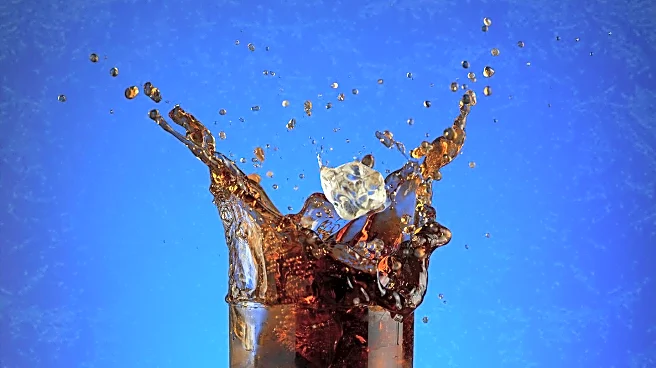What is the story about?
What's Happening?
Recent research presented at United European Gastroenterology Week 2025 has raised concerns about the health implications of consuming 'healthy' sodas. The study analyzed data from 103,251 participants in the UK Biobank, focusing on their consumption of sugar-sweetened and low- or non-sugar-sweetened beverages. Findings indicate that consuming more than 250 grams of these beverages daily is associated with a significantly higher risk of developing metabolic dysfunction-associated steatotic liver disease (MASLD), previously known as non-alcoholic fatty liver disease (NAFLD). The risk increased by 50% for sugar-sweetened beverages and 60% for low- or non-sugar-sweetened beverages. Over a 10-year follow-up, 949 participants developed MASLD, and 103 died from liver-related causes. The study suggests that even beverages marketed as healthier alternatives may contribute to liver fat accumulation and metabolic disruption.
Why It's Important?
The findings are significant as they challenge the perception of 'healthy' sodas as safe alternatives to traditional sugary drinks. MASLD is a serious condition that can lead to liver scarring, end-stage liver disease, and increased risk of heart disease and diabetes. The study highlights the potential health risks associated with artificial sweeteners, which may alter glucose and insulin handling, contributing to insulin resistance and fat accumulation in the liver. This research underscores the importance of scrutinizing the health claims of beverages marketed as low-calorie or sugar-free, as they may still pose health risks. Consumers and health professionals need to be aware of these findings to make informed dietary choices.
What's Next?
The study's authors suggest moderation in the consumption of 'healthy' sodas and recommend water as the best beverage choice. Further research is needed to explore the mechanisms by which artificial sweeteners affect liver health and to identify specific beverages that may pose higher risks. Health experts may advocate for clearer labeling and consumer education regarding the potential risks of low- and non-sugar-sweetened beverages. The beverage industry might face increased scrutiny and pressure to reformulate products to ensure they are genuinely health-oriented.
Beyond the Headlines
The study raises ethical questions about the marketing practices of beverage companies that promote products as healthy alternatives without fully disclosing potential health risks. It also highlights the need for regulatory oversight to ensure that health claims are substantiated by scientific evidence. Long-term, this research could influence public health policies and consumer behavior, leading to a shift towards more natural and less processed beverage options.















